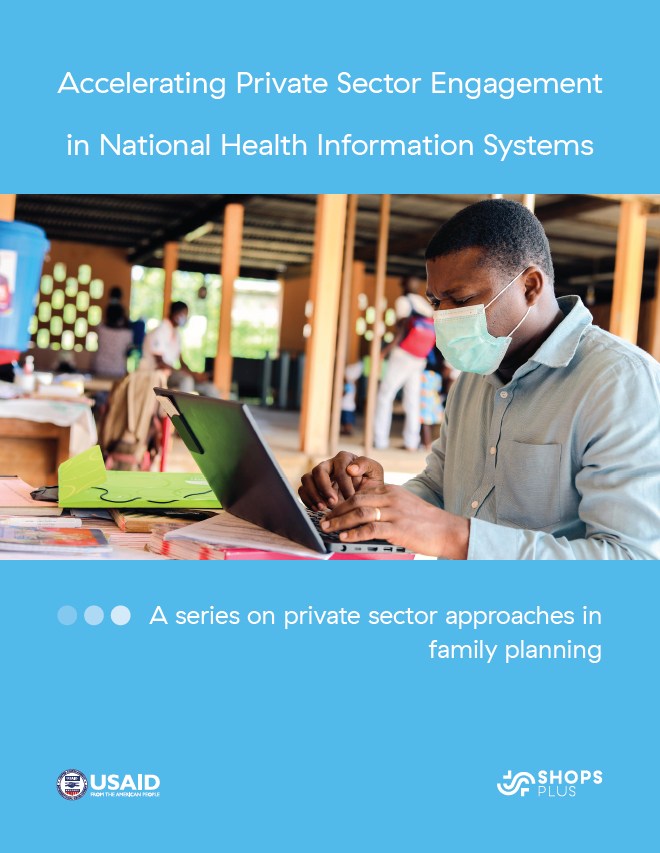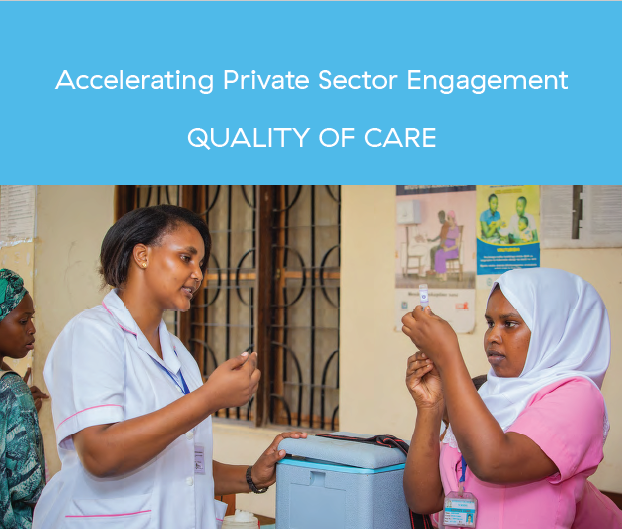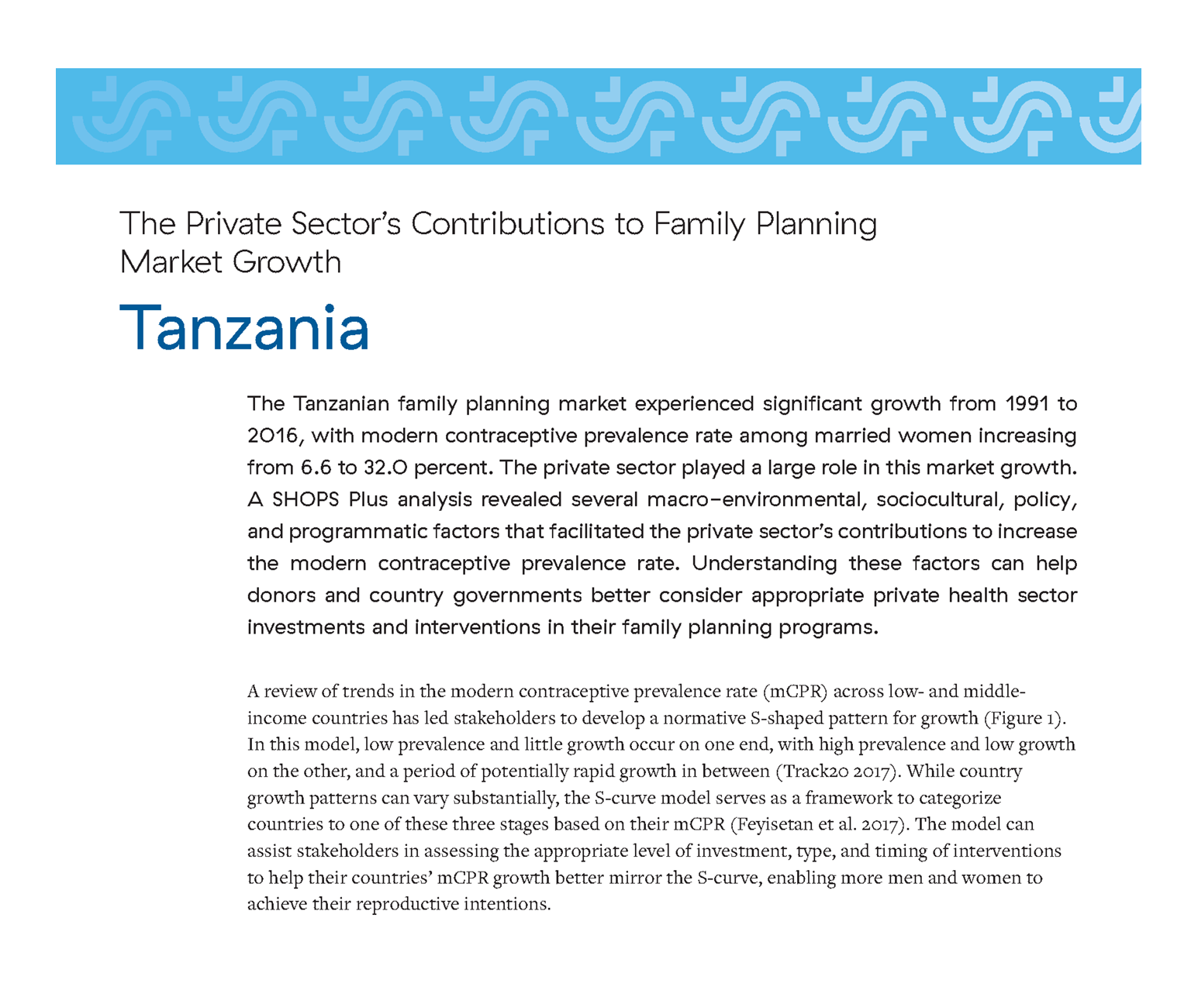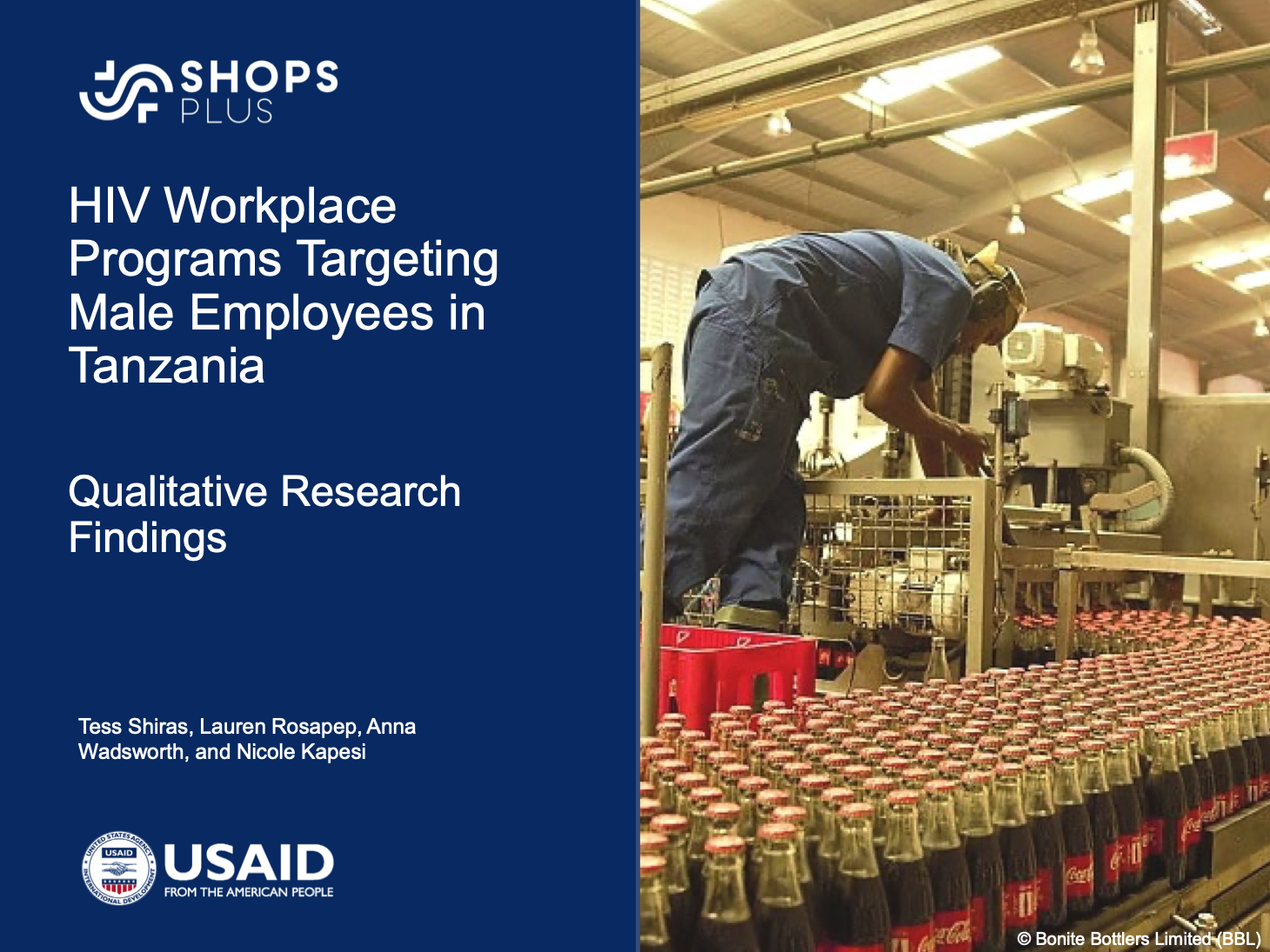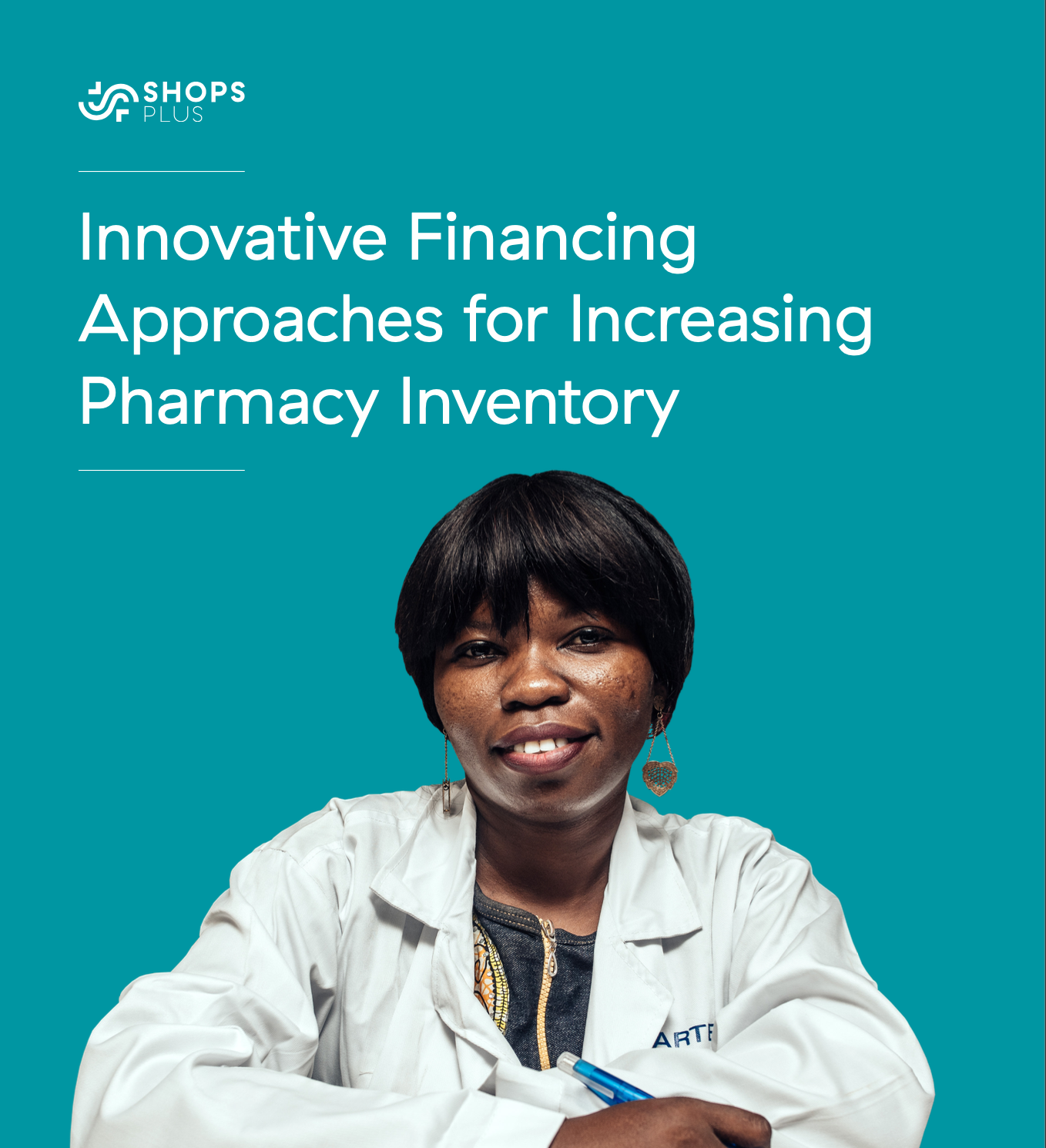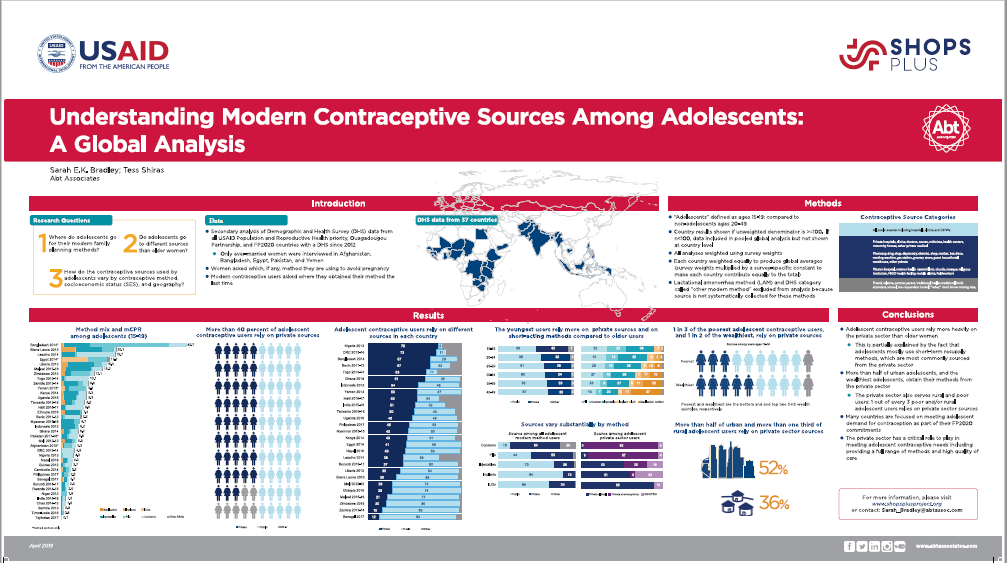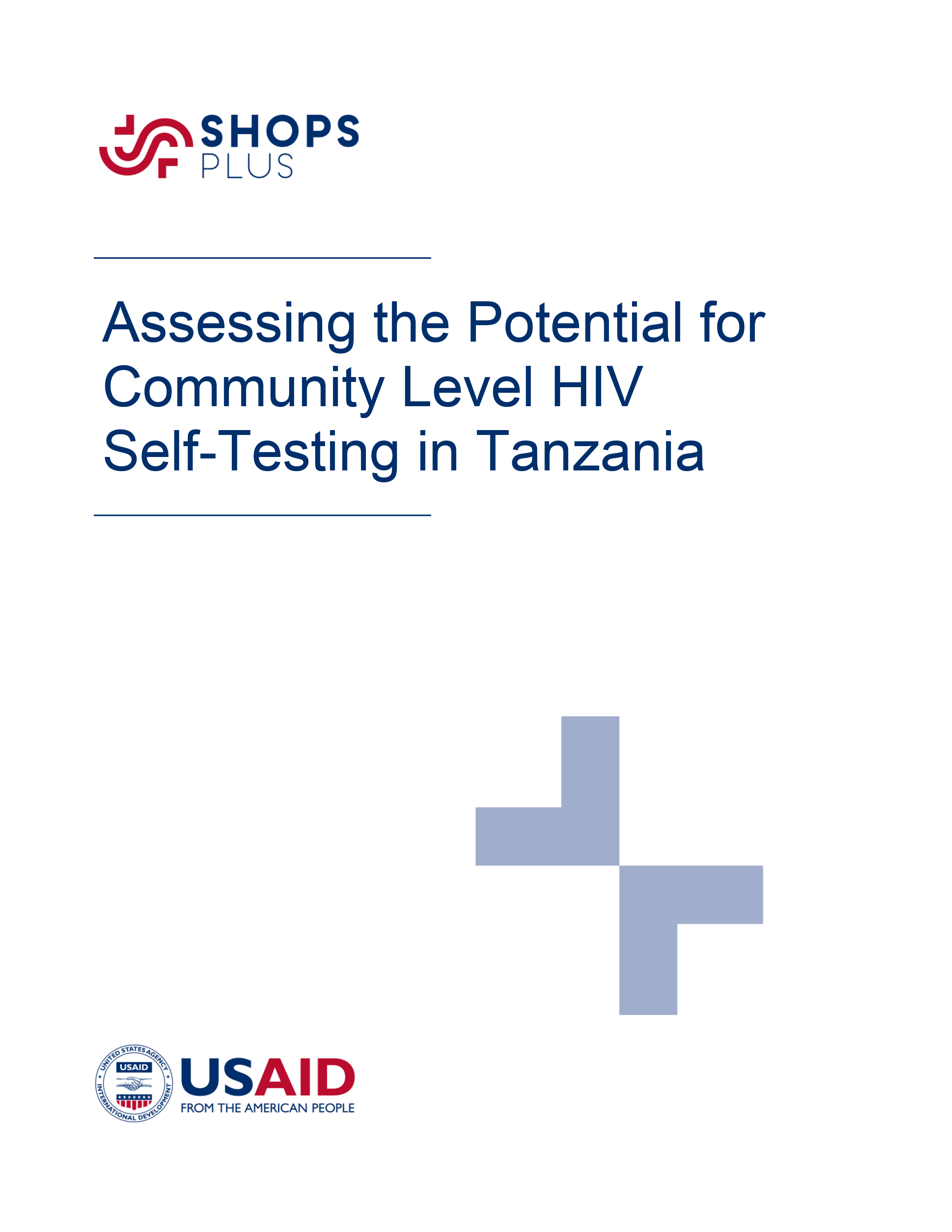
Resource Library
Accelerating Private Sector Engagement in National Health Information Systems
A national health management information system (HMIS) is the foundation for effective oversight, management, and provision of health information, products, and services in a country. The private sector is often a significant source of health products and services, yet few countries have fully galvanized routine reporting by private health care providers. This results in incomplete data on the types, volumes, and quality of services and products delivered through private sector channels and limits the ability of public health officials to effectively engage and steward both the public and private health sectors. To address this gap, this report establishes a framework for examining and supporting private sector participation in a national HMIS. The framework identifies common barriers to private provider engagement in a national HMIS, shares global case studies, and offers actionable recommendations to governments, private providers, donors, and implementing partners.
Resource Type : Report
Country : Ghana, Kenya, Madagascar, Senegal, Tanzania
Year : 2021-03-25T16:00:00
Language : English
Project : SHOPS Plus

Resource Library
Accelerating Private Sector Engagement: Quality of Care
Privately delivered health care is an important component of many countries’ national health system service offerings. Ensuring that care is of a high quality is a priority for the global community. This brief shares a range of approaches and implementation experiences that focus on improving the quality of private health care from SHOPS Plus work in Madagascar, Nigeria, Senegal, and Tanzania. It provides broad and contextual lessons as well as practical tips for implementing partners and donors who want to support efforts assuring and improving the quality of private health service delivery.
Resource Type : Brief
Country : Madagascar, Nigeria, Senegal, Tanzania
Year : 2021-03-17T10:00:00
Language : English
Project : SHOPS Plus

Resource Library
Tanzania: The Private Sector's Contributions to Family Planning Market Growth
The Tanzanian family planning market experienced significant growth from 1991 to 2016, with modern contraceptive prevalence rate among married women increasing from 6.6 to 32.0 percent. The private sector played a large role in this market growth. A SHOPS Plus analysis revealed several macro-environmental, sociocultural, policy, and programmatic factors that facilitated the private sector’s contributions to increase the modern contraceptive prevalence rate. Understanding these factors can help donors and country governments better consider appropriate private health sector investments and interventions in their family planning programs.
This is one in a series of briefs that examines the family planning markets in six countries. Click here to access the additional country briefs and a full synthesis of the six country analyses.
Resource Type : Brief
Country : Tanzania
Year : 2021-01-13T08:00:00
Language : English
Project : SHOPS Plus

Resource Library
HIV Workplace Programs Targeting Male Employees in Tanzania: Qualitative Research Findings
In Tanzania, HIV prevalence is more than twice as high among employed than unemployed males, and HIV positive men are less likely to know their status than HIV positive women. In 2008, Tanzania enacted an HIV and AIDS Prevention and Control Act, which mandates HIV workplace interventions. However, such interventions are not consistently implemented.
SHOPS Plus Tanzania conducted qualitative research with male employees from two corporate workplace partners and one association partner to understand experiences with and preferences for HIV workplace programs and to inform potential programs. The presentation shares study objectives, methods, and results on general health care seeking experiences, HIV perceptions and information sources, barriers and motivators to HIV testing, preferences for HIV testing and treatment, and opportunities for future HIV workplace programs.
Resource Type :
Country : Tanzania
Year : 2020-12-21T11:00:00
Language : English
Project : SHOPS Plus

Resource Library
Accelerating Private Sector Engagement: Public-Private Engagement
Public stewards in many countries are increasingly interested in working with the private sector to achieve health goals, and there is wide recognition that the sector can improve access to care. This brief shares a range of approaches and experiences in public-private engagement from SHOPS Plus work in Nigeria, Senegal, and Tanzania. It provides lessons learned and practical tips for donors who want to support future efforts in public-private engagement in health.
Resource Type : Brief
Country : Nigeria
Year : 2020-12-16T07:53:00
Language : English
Project : SHOPS Plus

Resource Library
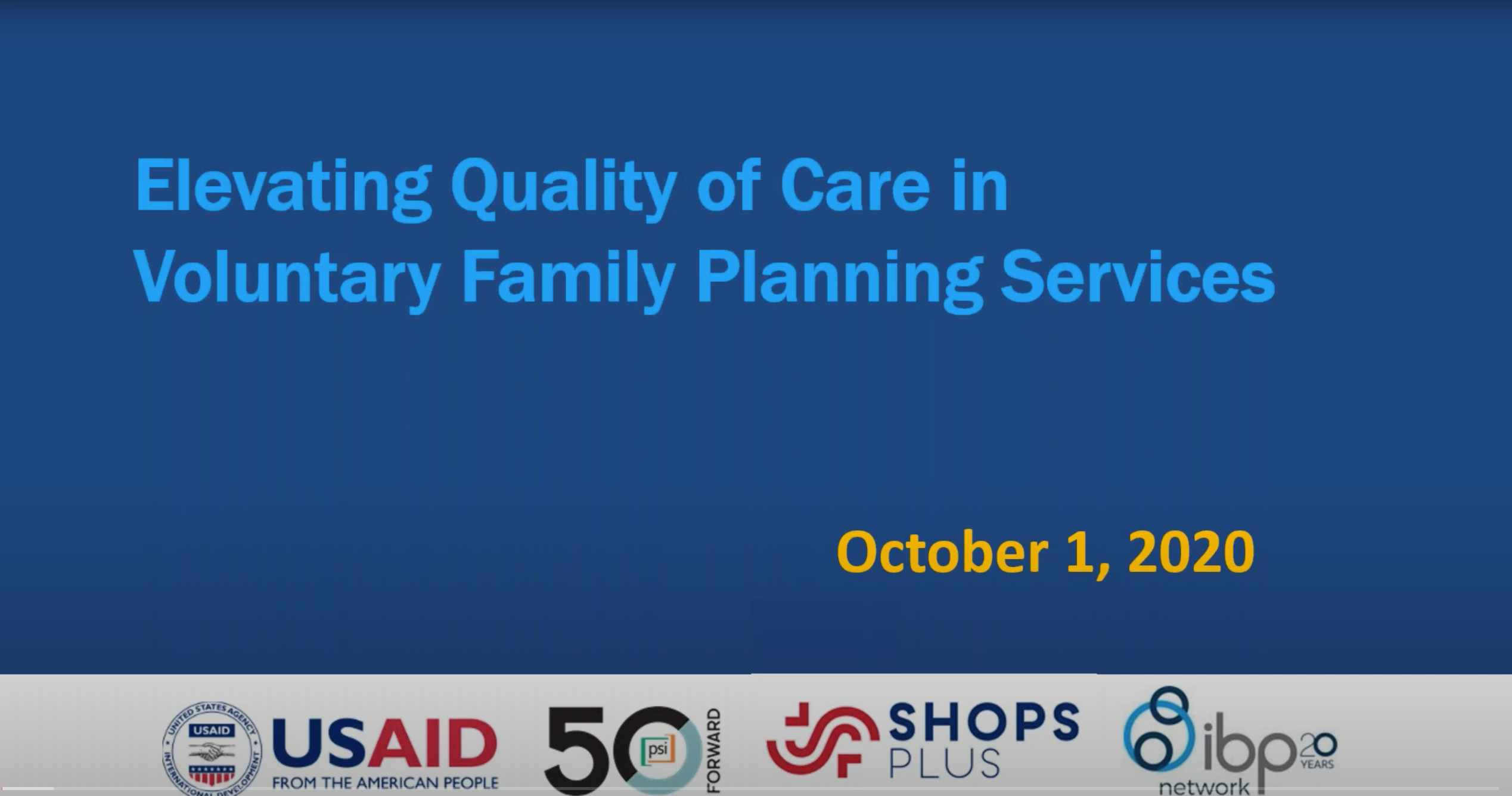
Video: Elevating Quality of Care in Voluntary Family Planning Services
The IBP Network hosted a webinar on October 1, 2020, that brought together representatives from the USAID-funded SIFPO2 and SHOPS Plus projects to discuss how quality of care is examined, understood, and measured from system, provider, and client perspectives. The presenters offered practical experiences from Nigeria, Senegal, Tanzania, and Uganda, and discussed how the global discourse on quality of care continues to evolve.
Resource Type : Webinar
Country :
Year : 2020-10-21T09:30:00
Language : English
Project : SHOPS Plus

Resource Library
Innovative Financing Approaches for Increasing Pharmacy Inventory
Private pharmacies and drug shops are important providers of family planning products in many low- to middle-income countries. This brief explores ways to expand access to finance for both. It explains the role of private pharmacies and drug shops within the family planning and health commodity supply chain; identifies how lack of access to financing constrains their ability to contribute to health outcomes; and provides an overview of their financing needs. It then presents a case study on programming in Nigeria designed to address these needs and concludes with recommendations for future programming to expand their access to financing. This brief consolidates learning from two projects—USAID-funded Sustaining Health Outcomes through the Private Sector (SHOPS) Plus and a predecessor, Strengthening Health Outcomes through the Private Sector Nigeria project (SHOPS Nigeria)—about approaches that have yielded positive results to increase financing along the supply chain for family planning commodities.
Resource Type : Brief
Country : Nigeria, Tanzania
Year : 2020-06-24T15:48:00
Language : English
Project : SHOPS Plus

Resource Library
Understanding Modern Contraceptive Sources Among Adolescents: A Global Analysis
The unique contraceptive needs of adolescents are increasingly recognized among the global family planning community. Recent reports on adolescent contraception emphasize the need for high-quality data to inform efforts to increase adolescent contraceptive use, access, and choice. SHOPS Plus conducted a secondary analysis of Demographic and Health Survey data in 37 countries to examine where adolescents obtain their contraceptives, and how sources vary by method and socioeconomic status. The results elucidate the important role that the private sector plays in helping adolescents meet their reproductive intentions: on average, 40 percent of adolescent users rely on private sector sources, with substantial variation by country. Private sector reliance is higher among urban and wealthy adolescents, but the private sector also serves 1 in 3 poor and/or rural adolescent users. Policymakers and program implementers must include the private sector in efforts to successfully meet contraceptive demand and increase access among youth.
This poster was presented by Sarah Bradley at the Population Association of America Annual Meeting on April 11, 2019 in Austin, TX.
Resource Type : Presentation
Country : Bangladesh, Benin, Ethiopia, Ghana, Haiti, India, Kenya, Malawi, Mali, Nepal, Nigeria, Pakistan, Philippines, Rwanda, Sénégal, Senegal, Tanzania, Uganda, Zambia, Zimbabwe
Year : 2019-07-25T14:54:22
Language : English
Project : SHOPS Plus

Resource Library
Assessing the Potential for Community Level HIV Self-Testing in Tanzania
In Tanzania, nearly 50 percent of people living with HIV/AIDS ages 15-64 are still undiagnosed and currently unaware of their status, 47 percent are on antiretroviral therapy, and roughly 42 percent are virally suppressed. Options for HIV self-testing are critical to helping the government of Tanzania and implementing partners achieve these goals. As HIV self-testing is an emerging option in Tanzania, stakeholders across the health system are considering how and where to introduce HIV self-testing. There is need for additional information to help guide the appropriate introduction of HIV self-testing as part of a differentiated approach to HIV testing services. To address this need, SHOPS Plus carried out a technical assessment to explore the policy, commercial, and health system-related issues that support or detract from the feasibility of using Accredited Drug Dispensing Outlets or other community-level private sector outlets as a potential venue for HIV self-testing retail and distribution.
Resource Type : Report
Country : Tanzania
Year : 2019-05-09T16:29:00
Language : English
Project : SHOPS Plus

Resource Library
Tanzania Total Market Approach for Condoms: Mixed-Methods Research Results
In Tanzania, condoms are a key contraceptive product. However, the condom market is flooded by donor supply, jeopardizing its sustainability. In response, SHOPS Plus is collaborating with the Tanzanian Government to better coordinate public and private condom distribution through a total market approach (TMA). To inform the strategy, we conducted focus groups with male condom users to understand factors that influence condom selection choices and ability and willingness to pay. We also conducted a retail audit to assess availability of different brands and prices. Preliminary qualitative findings show that men are loyal to subsidized condoms and are willing to pay above market prices. Quantitative data will show areas with high commercial activity and those with insufficient availability of condoms at any price. These data are expected to fill a critical need in the development of a TMA effort and potentially question assumptions behind current condom pricing, branding, and distribution strategies.
This poster was presented by Marianne El-Khoury at the Population Association of America Annual Meeting on April 11, 2019 in Austin, TX.
Resource Type : Presentation
Country : Tanzania
Year :
Language : English
Project : SHOPS Plus
Pagination
- Previous page
- Page 4
- Next page


